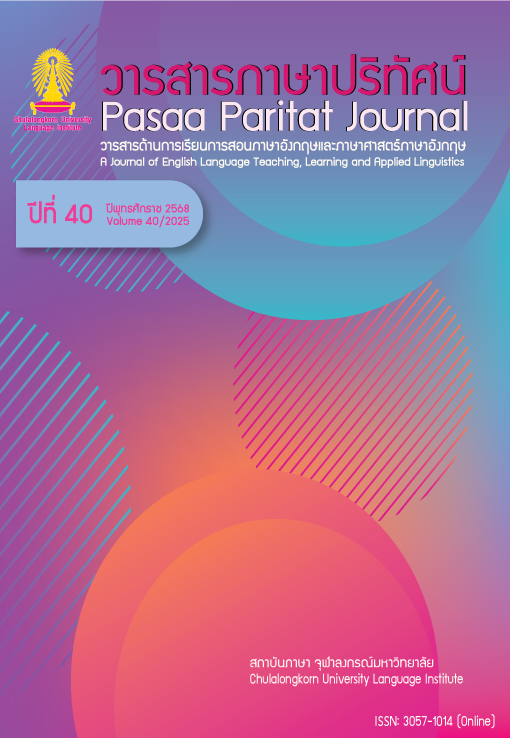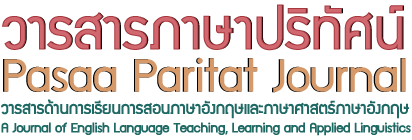Exploring Technology Integration in Thai Preservice English Teacher Education: Curriculum Analysis and Stakeholder Perspectives
DOI:
https://doi.org/10.58837/CHULA.PPJ.40.2คำสำคัญ:
technology integration, preservice English teachers, curriculum analysis, English teacher education, technological pedagogical content knowledge (TPACK)บทคัดย่อ
Technology integration in language education has become increasingly crucial, particularly in response to unprecedented educational disruptions. This study examines how Thailand's preservice English teacher education programs prepare future educators for technology integration in language instruction. Using a mixed-methods approach, the research analyzed twenty-eight Bachelor of Education in English curricula from state-accredited universities, combining curriculum content analysis with stakeholder interviews. The investigation focused on two primary dimensions: the structural composition of technology-related coursework and the development of technological pedagogical content knowledge (TPACK). Findings reveal significant variations in how programs approach technology preparation and highlight specific challenges in developing preservice teachers' digital competencies. This study contributes to the broader discourse on technology integration in language teacher education and provides evidence-based recommendations for enhancing preservice English programs in diverse educational contexts.
เอกสารอ้างอิง
Alhamami, M., & Costello, H. (2019). Pre-service EFL teachers' expectations, needs, and challenges in a language learning and technology course. Journal of Language Teaching and Research, 10(3), 607–616. http://dx.doi.org/10.17507/jltr.1003.23
Boonmoh, A., & Kulavichian, I. (2023). Exploring Thai EFL pre-service teachers’ technology integration based on the SAMR model. Contemporary Educational Technology, 15(4), Article ep457. https://doi.org/10.30935/cedtech/13567
Boonmoh, A., & Sanmuang, K. (2024). Challenges of ICT teachers in integrating digital literacy post-COVID-19 curriculum revisions in Thailand’s English teacher education programs. International Journal of Education and Literacy Studies, 12(3), 208–215. https://doi.org/10.7575/aiac.ijels.v.12n.3p.208
Bowen, G. A. (2009). Document analysis as a qualitative research method. Qualitative Research Journal, 9(2), 27–40. https://doi.org/10.3316/QRJ0902027
Çalışkan, E., & Caner, M. (2022). E-readiness of EFL teachers. Malaysian Online Journal of Educational Technology, 10(1), 1–15. http://dx.doi.org/10.52380/mojet.2022.10.1.266
Caws, C., & Heift, T. (2016). Evaluation in CALL: Tools, interactions, outcomes. In F. Farr & L. Murray (Eds.), The Routledge handbook of language learning and technology (pp. 127–140). Routledge.
Chapelle, C. A. (2006). Foreword. In P. Hubbard & M. Levy (Eds.), Teacher education in CALL (pp. vii–viii). John Benjamins. https://doi.org/10.1075/lllt.14
Chapelle, C. A. (Ed.). (2013). The encyclopedia of applied linguistics. Wiley-Blackwell.
Chapelle, C. A. (2016). CALL in the year 2000: A look back from 2016. Language Learning & Technology, 20(2), 159–161. http://dx.doi.org/10125/44468
Chapelle, C. A., & Sauro, S. (Eds.). (2017). The handbook of technology and second language teaching and learning. Wiley. https://doi.org/10.1002/9781118914069
Chapelle, C. A., & Voss, E. (2016). 20 years of technology and language assessment in Language Learning & Technology. Language Learning & Technology, 20(2), 116–128. http://dx.doi.org/10125/44464
Creswell, J. W. (2018). Research design: Qualitative, quantitative, and mixed methods approaches (5th ed.). SAGE Publications.
Darsih, E., Agustiana, V., Rahmatunisa, W., & Hanggara, A. (2024). Factors affecting preservice English teachers' technological pedagogical content knowledge (TPACK). Indonesian Journal of Language Instruction, 7(2), 95–106. https://doi.org/10.25134/ijli.v7i2.10943
DelliCarpini, M. (2012). Building computer technology skills in TESOL teacher education.
Language Learning & Technology, 16(2), 14–23. http://dx.doi.org/10125/44280
Dörnyei, Z. (2007). Research methods in applied linguistics: Quantitative, qualitative, and mixed methodologies. Oxford University Press.
EF Education First. (2024). EF English proficiency index. https://www.ef.co.th/epi/regions/asia/thailand
Farr, F., & Murray, L. (2016). Introduction: Language learning and technology. In F. Farr & L. Murray (Eds.), The Routledge Handbook of Language Learning and Technology (pp. 1–6). Routledge. https://doi.org/10.4324/9781315657899
Habibi, A., Razak, R. A., Yusop, F. D., & Mukminin, A. (2019). Preparing future EFL teachers for effective technology integration: What do teacher educators say? Asian EFL Journal, 21(2.2), 1–15. https://www.elejournals.com/asian-efl-journal/asian-efl-journal-volume-21-issue-2-2-march-2019/
Healey, D. (2016). Language learning and technology: Past, present and future. In F. Farr & L. Murray (Eds.), The Routledge handbook of language learning and technology (pp. 9–24). Routledge. https://doi.org/10.4324/9781315657899
Healey, D., Hegelheimer, V., Hubbard, P., Ioannou-Georgiou, S., Kessler, G., & Ware, P. (2008). TESOL technology standards framework. TESOL International Association.
Hegelheimer, V. (2006). When the technology course is required. In P. Hubbard & M. Levy (Eds.), Teacher education in CALL (pp. 117–133). John Benjamins. https://doi.org/10.1075/lllt.14
Hubbard, P. (2008a). Teacher education in CALL: The seven central questions. In W. Wang & X.
D. Liu (Eds.), Digital and networked foreign language learning and teaching (pp. 1–18). Foreign Language Teaching and Research Press.
Hubbard, P. (2008b). CALL and the future of language teacher education. CALICO Journal, 25(2), 175–188. https://doi.org/10.1558/cj.v25i2.175-188
Hubbard, P., & Ioannou-Georgiou, S. (Eds.). (2017). Teaching English reflectively with technology: A project of IATEFL’s learning technologies special interest group in collaboration with TESOL’s computer-assisted language learning interest section. IATEFL.
Johnson, R. B., & Onwuegbuzie, A. J. (2004). Mixed methods research: A research paradigm whose time has come. Educational Researcher, 33(7), 14–26. https://doi.org/10.3102/0013189X033007014
Kessler, G. (2006). Assessing CALL teacher training: What are we doing and what could we do better? In P. Hubbard & M. Levy (Eds.), Teacher education in CALL (pp. 23–42). John Benjamins. https://doi.org/10.1075/lllt.14
Kessler, G. (2016). Technology standards for language teacher preparation. In F. Farr & L. Murray (Eds.), The Routledge handbook of language learning and technology (pp. 173–185). Routledge. https://doi.org/10.4324/9781315657899
Kessler, G. (2018). Technology and the future of language teaching. Foreign Language Annals, 51(1), 205–218. https://doi.org/10.1111/flan.12318
Kessler, G., & Hubbard, P. (2017). Language teacher education and technology. In C. A. Chapelle & S. Sauro (Eds.), The handbook of technology and second language teaching and learning (pp. 278–292). Wiley. https://doi.org/10.1002/9781118914069.ch19
Khatoony, S., & Nezhadmehr, M. (2020). EFL teachers' challenges in integration of technology for online classrooms during Coronavirus (COVID-19) pandemic in Iran. Asian Journal of English Language and Pedagogy, 8(2), 39–51. https://doi.org/10.37134/ajelp.vol8.2.7.2020
Koehler, M. J., & Mishra, P. (2009). What is technological pedagogical content knowledge? Contemporary Issues in Technology and Teacher Education, 9(1), 60–70. https://citejournal.org/volume-9/issue-1-09/general/what-is-technological-pedagogicalcontent-knowledge/
Krippendorff, K. (2018). Content analysis: An introduction to its methodology (4th ed.). SAGE Publications.
Lestari, N. A., & Asari, S. (2022). TPACK in practice: EFL pre-service teachers on integrating technology during online teaching in Thailand. Journal of English Language and Language Teaching, 6(1), 1–16. https://doi.org/10.36597/jellt.v6i1.11999
Liu, M. H., & Kleinsasser, R. C. (2015). Exploring EFL teachers' CALL knowledge and competencies: In-service program perspectives. Language Learning & Technology, 19(1), 119–138. https://doi.org/10.10125/44405
Miles, M. B., & Huberman, A. M. (1994). Qualitative data analysis: An expanded sourcebook (2nd ed.). SAGE Publications.
Ministry of Education. (2020). Education strategic plan, Ministry of Education. http://www.en.moe.go.th/enMoe2017/index.php/policy-and-plan/education-strategic-plan
Ministry of Science and Technology, National Science and Technology Development Agency, National Electronics and Computer Technology Center. (2011). Executive summary Thailand information and communication technology policy framework (2011-2020): ICT 2020. Ministry.
Mirhosseini, S.-A. (2020). Doing qualitative research in language education. Palgrave Macmillan. https://doi.org/10.1007/978-3-030-56492-6
Nazikian, F., & Park, J. (2016). How to develop "21st century skills" in foreign language education. Japanese Language and Literature, 50(2), 347–373. https://www.jstor.org/stable/24892016
Office of the Education Council. (2017). Education in Thailand. OEC. https://backoffice.onec.go.th/uploads/Book/1532-file.pdf
OECD/UNESCO. (2016). Education in Thailand: An OECD-UNESCO perspective, reviews of national policies for education. OECD Publishing. https://doi.org/10.1787/9789264259119-1-en
Peters, M. (2006). Developing computer competencies for preservice language teachers: Is one course enough? In P. Hubbard & M. Levy (Eds.), Teacher education in CALL (pp. 153–165). John Benjamins Publishing. https://doi.org/10.1075/lllt.14.14pet
Rupavijetra, P., & Rupavijetra, P. (2022). Changes in teacher education requirements in Thailand in the twenty-first century. In M. S. Khine & Y. Liu (Eds.), Handbook of research on teacher education (pp. 607–632). Springer. https://doi.org/10.1007/978-981-16-9785-2_30
Soule, M. V., & Papadima-Sophocleous, S. (2019). Exploring the influence of teachers' education and professional development in Cypriot higher education CALL practices. In C. N. Giannikas, E. Kakoulli Constantinou, & S. Papadima-Sophocleous (Eds.), Professional development in CALL: A selection of papers (pp. 25–37). Research-publishing.net. https://doi.org/10.14705/rpnet.2019.28.868
Shulman, L. S. (1986). Those who understand: Knowledge growth in teaching. Educational Researcher, 15(2), 4–14. https://doi.org/10.3102/0013189X015002004
Syaifudin, M., & van Rensburg, H. (2018). Considerations for the development of computer-assisted language learning (CALL) teacher training course: A practical experience from a CALL course development in Indonesia. Arab World English Journal (AWEJ) Special Issue on CALL, 4, 84-108. https://doi.org/10.24093/awej/call4.7
Tafazoli, D. (2022). CALL teacher education and professional development: A retrospective synthesis of the two decades of Teaching English with Technology. Teaching English with Technology, 22(3–4), 1–19. https://files.eric.ed.gov/fulltext/EJ1367621.pdf
Tai, S.-J. D. (2015). From TPACK-in-action workshops to classrooms: CALL competency developed and integrated. Language Learning & Technology, 19(1), 139–164. https://doi.org/10.10125/44406
Teddlie, C., & Tashakkori, A. (2009). Foundations of mixed methods research: Integrating quantitative and qualitative approaches in the social and behavioral sciences. SAGE.
Torsani, S. (2016). Call teacher education language teachers and technology integration. https://doi.org/10.1007/978-94-6300-477-0
UNESCO. (2018). UNESCO ICT Competency Framework for Teachers. https://unesdoc.unesco.org/ark:/48223/pf0000265721_eng
Wang, M.-J., & Liu, Y.-yuan. (2009). A preliminary study on the policy and the reality of ICT integration into English instruction. KHC Journal of General Education, 5, 1–16.
Yeh, C.-Y. (2018). Investigating technology integration in United States TESOL teacher preparation programs [Doctoral dissertation, University of Delaware]. https://doi.org/10.58088/df5c-qr26
Zhang, Y. & Deroo, M. (2017). Technology Instruction in Language Teacher Education Programs. In C. Lin, D. Zhang, & B. Zheng (Eds.), Preparing Foreign Language Teachers for Next-Generation Education (pp. 1-22). IGI Global Scientific Publishing. https://doi.org/10.4018/978-1-5225-0483-2.ch001
ดาวน์โหลด
เผยแพร่แล้ว
รูปแบบการอ้างอิง
ฉบับ
ประเภทบทความ
สัญญาอนุญาต
ลิขสิทธิ์ (c) 2025 วารสารภาษาปริทัศน์

อนุญาตภายใต้เงื่อนไข Creative Commons Attribution-NonCommercial-NoDerivatives 4.0 International License.



